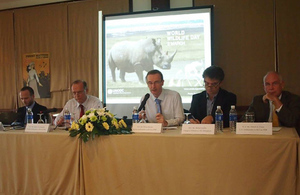Development Partners join forces to mark first ever World Wildlife Day
Development partners joined forces to mark the first ever World Wildlife Day on 3 March.

United Nations Office on Drugs and Crime (UNODC), the UK, Germany, France, EU and the US, joined forces to mark the first ever World Wildlife Day, which fell on 3 March.
The event was an opportunity to highlight ongoing co-operation with Lao PDR on a range of issues including forestry governance and tackling the illegal trade in wildlife and timber, and the urgent need to act to prevent further depletion of biodiversity and the trade in endangered species. It gathered together around 50 development partners, government officials and civil society contacts.
The event also followed Lao PDR’s successful participation in the recent London Conference on the Illegal Wildlife Trade in February where 42 countries, including Lao PDR, plus 11 international organisations, agreed a political declaration which could mark a turning point in the fight to end wildlife crime. This included commitments to renounce the commercial international trade in elephant ivory until such time as elephants are no longer threatened by poaching; renouncing the use of products from animals threatened with extinction; and adopting legislation that makes wildlife trafficking a “serious crime” in the context of the UN Convention against Transnational Organised Crime.
Opening Thursday’s World Wildlife Day event, British Ambassador to Lao PDR, Philip Malone said:
I am delighted to be working together with international partners to promote this important new World Wildlife Day. The illegal trade in wildlife products not only threatens the survival of some of our most iconic species, but undermines good governance and the security of fragile states; it corrupts the rule of law; supports organised crime networks; and hinders efforts to tackle long term poverty. I welcome the Lao government’s constructive participation in the London Conference on the Illegal Wildlife Trade and look forward to working together, and with development partners, on follow-up initiatives.
EU Charge d’Affaires Michel Goffin and German Ambassador Robert Von Rimscha used the occasion to highlight ongoing co-operation with Lao PDR in the forestry sphere and raise concerns about the trade in illegal wood products. Michel Goffin said:
The EU is fully committed to leading global efforts to fight illegal logging. Illegal logging leads to deforestation that contributes to a loss of biodiversity. Loss of habitat causes wildlife to live in fragmented patches of land and greatly reduces their home range and supply of food. It also decreases genetic diversity, affects the population’s ability to respond to environmental changes and increases the risk of wildlife extinction substantially.
U.S. Ambassador to the Lao PDR Daniel Clune highlighted the work that the United States is doing around the world and in Laos to stop the flow of illegal wildlife products. Ambassador Clune also congratulated the Lao PDR representatives for their participation in the recent London conference, and said the United States looks forward to working together with its Lao and international counterparts on this issue.
Robert von Rimscha stressed:
Illegal logging is not a minor problem, it is a major economic draw-back for Laos with devastating ecological consequences. With the implementation of the EU Timber Regulation the EU has chosen to allow only certified wood into its market. The FLEGT-VPA negotiations are well underway in many countries, such as Vietnam, who is an important export market for Lao timber. The EU will soon be able to satisfy its demands from certified sources alone. The window of opportunity for Laos to be a future trade partner of the EU in timber is therefore likely to close very soon.
According to the United Nations Office on Drugs and Crime criminal networks specialised in environment-related illegal trade in the Asia-Pacific region generate every year US$23 billion worth of revenues. This criminal business dwarfs the GDP of countries like Lao PDR and Cambodia. Lao PDR is considered to be both a source and transit country for wildlife species, wildlife parts, logs, and timber products reaching wealthier markets in the region and beyond. Rare wildlife is consumed throughout Asia – but particularly in China, Hong Kong, Taiwan, Vietnam and Thailand – for luxury meals, status symbol ornaments and in traditional medicine. 65% of the wood traded in Lao PDR is thought to be illegally sourced, with a government report citing this week illegal timber trading as the country’s most commonly uncovered economic crime.
World Wildlife Day on March 3rd brings together the secretariat of the Convention on International Trade in Endangered Species of Wild Fauna and Flora (CITES) and other relevant United Nations organizations to draw attention to the growing illegal trade in wildlife products worldwide. Executive Director of the UN Office on Drugs and Crime (UNODC), Yury Fedotov emphasised in a statement the importance of breaking with past traditions that help drive these crimes:
In today’s globalized society, young people are better informed and can drive change. They can make informed choices and decide not to be part of this trade which lines the pockets of criminals.